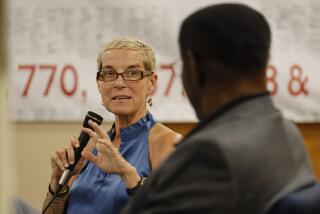OBITUARIES : Carroll R. Daugherty; Labor Economist, Arbitrator in Critical 1949 Steel Strike
- Share via
Carroll R. Daugherty, an internationally known labor economist and arbitrator who played a determining role in the 1949 steel strike that threatened to cripple the nation, has died in La Jolla, where he retired 13 years ago.
He was 87 when he died Wednesday at Scripps Memorial Hospital of liver cancer.
A professor emeritus at Northwestern University, where he taught for two decades, Daugherty was named by President Harry S. Truman to head three ad hoc committees seeking to settle threatened strikes in the steel and railroad industries in 1949-52.
The reports he issued were hailed in the press of the day as “epoch-making.” One of his proposals was for a non-contributory pension plan for steel workers. The idea set a trend in negotiations for private industry that continues to this day.
His proposals centered around avoiding the wage increases that had plagued industry since World War II, while widening fringe benefits for workers. Through his efforts the United Steelworkers of America scaled down their demands for a 30-cent hourly increase and accepted the Daugherty panel’s recommendation of 6 cents in pension benefits and 4 cents in life insurance, hospitalization and sick pay.
But the steel industry rejected the proposal and the union struck. When the strike was settled six weeks later the settlement involved many of Daugherty’s then-adventurous ideas.
Daugherty began work with the government in the 1930s in the Bureau of Labor Statistics. Holder of a doctoral degree from the University of Pennsylvania, he was chief economist for the new Wage and Hour Administration in the Roosevelt Administration and headed the Wage Stabilization Division of the National War Labor Board.
After World War II he led negotiations to settle lend-lease differences between the United States and New Zealand.
Daugherty joined the Northwestern faculty in 1946 and taught there until 1968, when he retired. Earlier he had been a professor at the University of Alabama, the University of Pittsburgh and Hunter College of the City University of New York.
He was the author of seven college texts dealing with labor, among them the standard “Labor Problems in American Industry” and “The Economics of the Iron and Steel Industry.”
He retired from arbitration practice in 1983 after becoming famous in that field for his “Seven Tests for Just Cause,” a standard he created for the dismissal and disciplining of employees. In 1986 the American Arbitration Assn., meeting in Los Angeles, awarded Daugherty its first Lifetime Achievement Award.
Survivors include his wife, Marion, two sons and two daughters.
More to Read
Sign up for Essential California
The most important California stories and recommendations in your inbox every morning.
You may occasionally receive promotional content from the Los Angeles Times.













